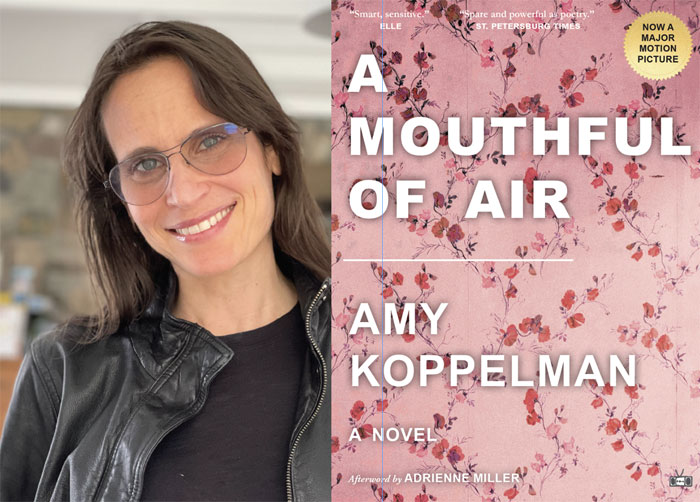 Author Amy Koppelman
Courtesy of: Eliza Wood-Obenauf
Author Amy Koppelman
Courtesy of: Eliza Wood-Obenauf Nationwide, about 1 in 8 mothers suffer from postpartum depression. While some may naturally feel a lack of energy or trouble concentrating when they’re in that newborn fog, others experience a much more dangerous form of it.
For Julie Davis, the main character in “A Mouthful of Air,” a novel and new movie by the same name, postpartum depression is all-consuming, and it’s threatening to destroy the world she’s built for herself.
Though things looks perfect from the outside – she has a beautiful baby, she lives in a nice home and her husband is successful – it is anything but. Right before her son’s first birthday, she slits her wrists in a suicide attempt. She survives but struggles with her mental illness every waking moment.
Amy Koppelman wrote “A Mouthful of Air” and directed the movie version, which is coming out on October 29 and stars Amanda Seyfried as Julie. The author, a mother of two, also experienced depression, shame, self-doubt and fear, but was mainly inspired to write the book after putting, “Can a mother hurt her child?” into a search engine.
“A fairly rudimentary website came up,” she said. “I clicked on it and there was a letter a mother wrote to her daughter who had recently taken her own life and the life of her child (the woman’s grandchild). It was the first time I ever saw the words ‘postpartum depression.’ There was a butterfly or an angel on the top left of the screen and I remember reading the letter and crying. The loss was so devastating. And I remember knowing – somehow in that moment – that this was a story worth telling.”
“A Mouthful of Air” follows Julie as she goes through the everyday motions, from caring for her baby to accompanying her husband to a sports game and seeing her doctor. When it seems like she’s on the mend, she becomes pregnant again and has to go off her antidepressants. At the same time, her husband buys a house on Long Island, so Julie becomes even more isolated.
Even though postpartum depression used to be a taboo topic, Koppelman said that now, people are talking about it more than ever before. Still, it’s not an easy discussion.
“The most important thing to me is that this movie helps – even in some small way – destigmatize mental illness and motherhood.” – Amy Koppelman
“Many of us we were taught – since we were little girls – that our worth is inextricably tied to our ability to reproduce and nurture. If we feel dead inside, fearful that we aren’t equipped, unsure if we have the tools to be a mom, then we are of no value. And that’s not true. Asking for help doesn’t make you weak. Expressing your insecurities doesn’t make you a bad mom. The most important thing to me is that this movie helps – even in some small way – destigmatize mental illness and motherhood.”
To cope with her depression, Koppelman said she sees a therapist, takes medication and spends “as much time as possible with my little family. I hunt for the tiny moments of beauty that make life worthwhile and try hard not to think about the inevitable goodbye.”
Depression is a common theme in her work; she also wrote “I Smile Back,” a novel and movie starring Sarah Silverman that follows a housewife who is addicted to drugs and alcohol. Like “A Mouthful of Air,” it is painfully truthful, depicting what it’s really like to struggle.
When adapting “A Mouthful of Air” for the screen, Koppelman said she wrote the movie specifically for Seyfried. “She’s been my partner in every step of the process, down to where I put a period versus a comma. There is no better collaborator. She’s as smart as she is pretty and one of the most genuine and kind people I have ever met.”
With the movie and the book, Koppelman hopes they not only shine a light on postpartum depression, but also encourage struggling mothers to find the help they need to heal.
“Suicide is never the answer,” she said. “Your kids are never better off without you. They need you. Everyone who loves you needs you. Postpartum depression is treatable. If you are suffering, please ask for help and get better.”























 More news and opinions than at a Shabbat dinner, right in your inbox.
More news and opinions than at a Shabbat dinner, right in your inbox.